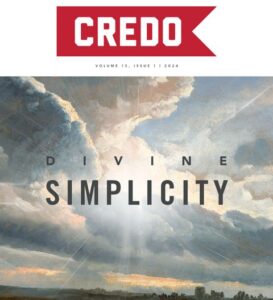Readers of my column may remember that my eyes were first opened to the beauty of divine simplicity through the work of the Reformed Scholastic Francis Turretin. I had encountered the doctrine elsewhere, through both introductory and advanced systematic works, but Turretin explained the concept in a way that I could not only grasp but appreciate.[1] Turretin’s helpful explanation of divine simplicity, however, is far from elementary as there are numerous metaphysical terms employed throughout his exposition.
To master divine simplicity (if one could ever dream of doing so) would require mastering complex ideas such as pure act, Turretin’s understanding of formal conceptions, and the fine line between real, virtual, and eminent distinctions. Still, even though the Institutes of Elenctic Theology are full of these abstract and ethereal considerations, one repeating theme can help serve as the reader’s north star as they journey into this complex doctrine – the Creator/creature distinction.
The Dependent Creature
It is not enough to say that God *is not* made up of parts but that God *cannot* be made up of parts. Click To Tweet At its core, divine simplicity is a creature’s attempt at identifying what God is not – in this case, God is not made up of parts. Creatures, as opposed to their Creator, are made up of all sorts of physical and metaphysical parts. Creaturely composition necessitates that all creatures are marked with a deep seeded dependence, as everything composed must be assembled by another. Indeed, Kelly Kapic has noted that “using ‘dependent’ as an adjective for ‘creature’ is basically redundant – there are no creatures who are not, by their very nature, dependent beings.”[2]
Our physical limbs are knit together in our mothers’ wombs, our existence came about because of the choices of other people, and our souls (like everything we possess) are a gift from God. I did not assemble myself, nor could I sustain myself without the aid of other dependent creatures. In classical thought, then, the rejection of divine simplicity would necessitate a greater being than God capable of connecting the divine pieces together. In the same way that non-existent entities cannot create themselves, composite beings cannot eliminate their dependence on their parts.
The Independent Creator
God, however, is entirely independent. If God is in need of something for His existence or perfection, then His divinity must be called into question. Indeed, for Turretin, “Composition implies imperfection inasmuch as it supposes passive power, dependency and mutability.”[3] This brings us to an important aspect of divine simplicity, especially as the doctrine is articulated by the Reformed. Divine simplicity does not simply mean (pardon the pun) that God is free from all composition and division, but also is “incapable of composition and divisibility.”[4] God is not simply a big person, sharing our imperfections with us or exalting the supposed virtue of dependence, as if God is somehow glorified in His need. Click To Tweet
It is not enough to say that God *is not* made up of parts but that God *cannot* be made up of parts. The mere introduction of passivity, in which God would receive perfection from another, would place creaturely imperfection within divinity. “God is a most pure act,” writes Turretin, “having no passive admixture and therefore rejecting all composition (because in God there is nothing which needs to be made perfect or can receive perfection from any other. . .).”[5] At this point, the gulf between Creator and creature could not be wider.
Furthermore, many of the complications surrounding our grasp of divine simplicity stem from our creatureliness. God alone is the only truly simple being, which means that nothing in our created world serves as a case study or launching pad for our understanding of divine simplicity. Most things are made up of divisible physical parts, other things may not be physically divisible but still exist as compositions of form and matter, and even in the most extreme cases we still acknowledge that we can divide the essences of all creatures from their existence. As such, our minds, steeped in a composite world, have great difficulty conceptualizing a truly simple being. Turretin’s distinctions concerning the divine attributes, however, can be quite helpful for our conceptualizing of divinity.
Divine Attributes and Formal Conceptions
Turretin is convinced that “the attributes of God cannot really differ from His essence or from one another (as one thing from another) because God is most simple and perfect,” and states that this belief is the orthodox position.[6] The claim that the divine attributes do not differ from one another is one of the most debated and controversial aspects of divine simplicity. Indeed, some have termed this belief as “strong simplicity” in order to suggest that there are other, more palatable models of simplicity that reject the mutual identify of attributes. Turretin, on the other hand, does not suggest that an alternative model of simplicity is held by the Reformed. He does, however, acknowledge that the attributes must be distinguished from one another in our formal conceptions, but he refuses to acknowledge that these distinctions really exist in the divine essence itself.
Our minds, working from the multitude of effects backwards to a common cause, compartmentalize and dissect that which actually exists as a single unit. Turretin explains,
Although the several attributes represent the most fertile and simple nature of God, yet they can represent it only inadequately (i.e., not according to its total relation, but now under this perfection, then under another). For what we cannot take in by one adequate conception as being finite, we divide into various inadequate conceptions so as to obtain some knowledge of him (which is not a proof of error in the intellect, but only of imperfection). Thus omnipotence is the divine essence itself apprehended as free from every obstacle in acting; eternity is the essence of God as without limit in duration; and so of the rest.[7]
Formal conceptions of attributes such as mercy and justice, then, are different things and can easily be distinguished from one another, but these attributes are not different things when considered absolutely – as they exist within the divine essence. What appears to be distinctions to us testifies more of our finitude than of God’s composition.
Turretin stands in a long line of believers who have confessed the magnificent simplicity of God.[8] God’s glorious nature is so great, so beyond anything that we have encountered in our creaturely experience, that it demands the transcendence of even the most common creaturely imperfection. Click To Tweet Doing so exalts the God who transcends all possible creaturely imperfections while acknowledging the vast difference between Him and us. God is not simply a big person, sharing our imperfections with us or exalting the supposed virtue of dependence, as if God is somehow glorified in His need. Rather, His divine life is marked by a completely different type of being – so much so, that it is more proper to call him the source, ground, or fount of being.[9]
While the mastering of the doctrine requires significant (but rewarding) legwork, the main takeaway could be summarized as thus: God’s glorious nature is so great, so beyond anything that we have encountered in our creaturely experience, that it demands the transcendence of even the most common creaturely imperfection. The most basic form of need and dependence experienced by every created thing finds no home in divinity. As such, this simple God, confessed throughout the history of the Church, is beyond capable of caring for our manifold needs and weaknesses, of which He has none.
Endnotes
[1] The go-to introductory work for divine simplicity would be James E. Dolezal, All That is in God: Evangelical Theology and the Challenge of Classical Christian Theism (Grand Rapids, MI: Reformation Heritage Books, 2017). For a more advanced treatment of the doctrine by the same author, readers are directed to James E. Dolezal, God Without Parts: Divine Simplicity and the Metaphysics of God’s Absoluteness (Eugene, OR; Pickwick, 2011). Another great evangelical work on this subject is Steven J. Duby, Divine Simplicity: A Dogmatic Account, T&T Clark Studies in Systematic Theology 30 (New York, NY: T&T Clark, 2016).
[2] Kelly M. Kapic, You’re Only Human: How Your Limits Reflect God’s Design and Why That’s Good News (Grand Rapids, MI; Brazos Press, 2022), 10-11.
[3] Francis Turretin, Institutes of Elenctic Theology, vol 1 (Phillipsburg, NJ: P&R Publishing, 1992), 191.
[4] Ibid.
[5] Ibid.
[6] Ibid., 188. Turretin distinguishes the Reformed affirmation of simplicity from the Remonstrant and Socinian denial of the doctrine.
[7] Ibid., 187-188.
[8] Turretin quotes both Augustine and Athanasius in his defense of divine simplicity, and other thinkers such as Thomas Aquinas, William Ames, and Petrus Von Mastricht could be included on this list. This list, of course, is but a small sampling of the patterned confession of divine simplicity that marks the Great Tradition.
[9] See 1689 London Baptist Confession of Faith 2.2
Image credit: Koen Jacobs


